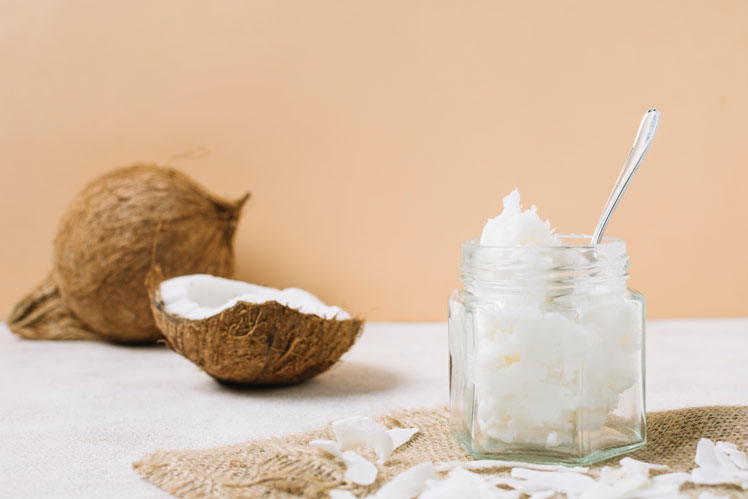
Spa photo created by freepik – www.freepik.com
Coconut oil is a vegetable oil obtained from the dried, oily pulp of coconuts (copra). Previously, coconut oil was traditionally used in soap making, for the manufacture of cosmetics, for the preparation of cooling fillings in waffle cakes and in the production of margarine, until it became widely used in cooking at the beginning of the XNUMXst century.
Coconut oil is often made by hot pressing fresh, dried coconut meat. Less commonly produced by cold pressing dried copra. This method is more gentle, which allows you to save all the useful properties of the oil, but with this method you can get no more than 10% of the total oil. Therefore, oils obtained by cold pressing are more expensive, but also more useful.
Coconut oil, whose beneficial cosmetic properties have been known since the reign of Cleopatra, is widely used in modern cosmetology. Even in those distant times, rich beauties used coconut oil for hair, face skin, hands and body, as a valuable moisturizing, nourishing and rejuvenating natural remedy, thanks to it, they maintained their beauty, well-groomed and noble appearance.
To date, the situation has not changed much. And even the fact that there is a huge selection of a wide variety of cosmetic preparations has not reduced the popularity of using coconut oil. Now this product has become even more affordable, absolutely any woman can successfully use it in her personal care.
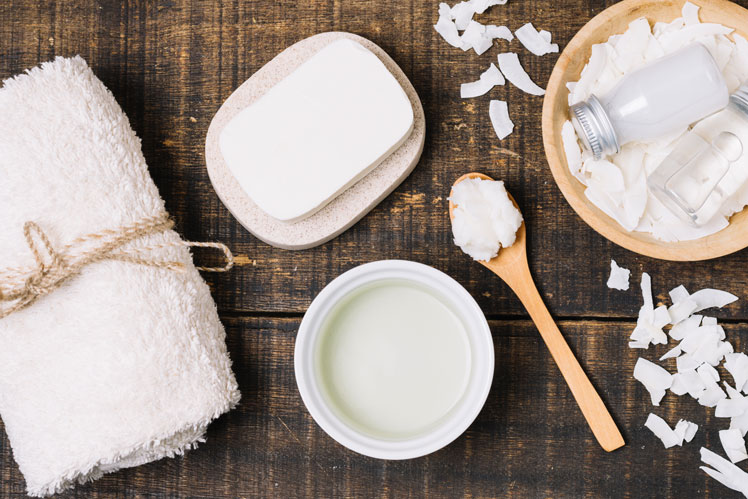
Tropical photo created by freepik – www.freepik.com
There are two types of coconut oil – non-edible and edible. The latter can be found in stores. The uniqueness of edible coconut oil is that it does not release carcinogens when heated. They can replace the usual sunflower oil, and then the dishes will acquire an exquisite taste. It is suitable for baking, sweet and vegetable dishes, seafood, salad dressings and adding to cereals and drinks.
The pour point of coconut oil is 19-23°C. When heated to 27 °C, it becomes transparent, liquid, straw-yellow in color. The smoke point of refined coconut oil is 175°C, which is lower than most edible oils (232°C for corn and sunflower), making it less suitable for deep frying and high-temperature frying.
Manufacturers use coconut oil as a food additive for the production of margarine and cake toppings.
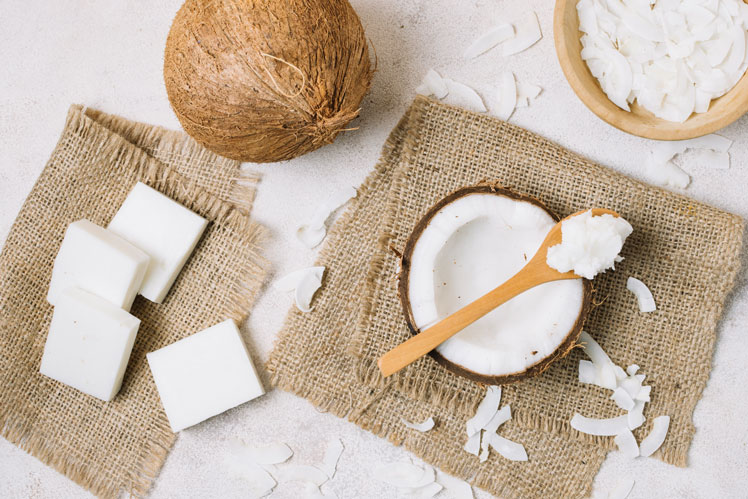
Spa photo created by freepik – www.freepik.com
Coconut oil is rich in nutrients and has a positive effect on the condition of the skin, and therefore is a fairly common ingredient in various industrial cosmetics. Also, this useful herbal product in home cosmetology can be used to enrich various creams, masks, balms, tonics, lotions and any other cosmetic products designed to nourish, soften or moisturize the skin (before adding coconut oil, it should be melted in a water bath beforehand (with temperature not higher than 40–45 °С).
Coconut oil is best for daily care of dry, irritated, inflamed, rough, mature and sluggish skin of the face and body (including coconut oil can be used for delicate care of sensitive skin around the eyes and décolleté). The use of coconut oil for problematic or oily skin is not recommended, as this product can provoke the appearance of comedones (blackheads) on the skin.
For skin care, it is recommended to use only refined coconut oil, adding it in a small amount to ready-made cosmetic preparations (in facial skin care products, the proportion of coconut oil should not exceed 10%, and in body skin care products, the optimal content of coconut oil is 30% of the total weight of the cosmetic).
In its pure, undiluted form, unrefined coconut oil can only be used for hair care, for treating cracked skin on the heels, or for treating rough skin in the elbow area.
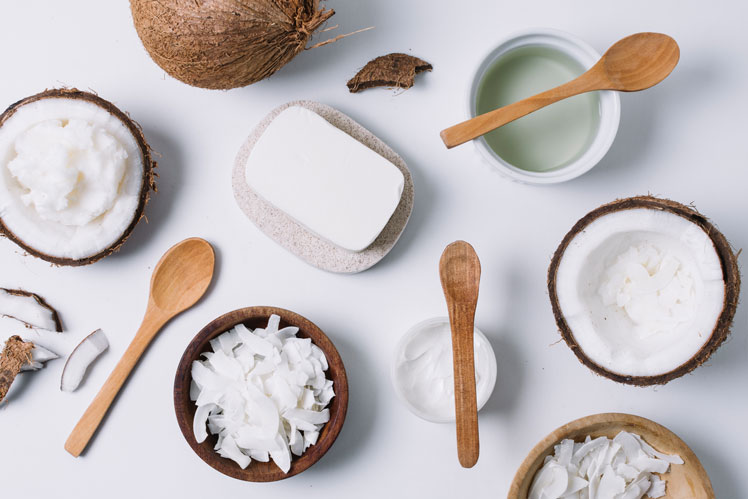
Spa photo created by freepik – www.freepik.com
Despite the huge number of useful properties, coconut oil has almost no contraindications. It should be abandoned only in case of individual intolerance.
The product should be eaten in moderation. You can eat no more than 3 tablespoons per day. The high amount of saturated fatty acids found in coconut oil contributes to an increase in high and low density lipoproteins, and in combination with a high calorie content, it contributes to weight gain.
Coconut oil for children is not harmful. There is evidence that it helps reduce the frequency of seizures in children suffering from epilepsy, as well as improve the condition of children with autism. Externally for children, the oil can be used to treat diaper rash, irritation, and to relieve itching after insect bites. In newborns, it will help to painlessly eliminate the crusts of the scalp.
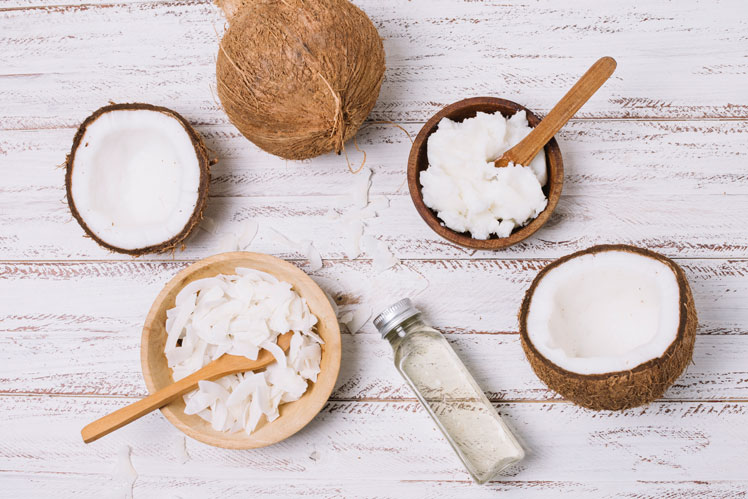
Fruit photo created by freepik – www.freepik.com
Interesting facts about the benefits of coconut oil
Coconut oil has rightly landed in a new food category called "Superfood". Among its benefits is that it promotes weight loss and improves brain activity, heals the skin.
Coconut Oil Contains Fatty Acids with Powerful Medicinal Properties
In the recent past, it was considered unhealthy due to its saturated fat content. In fact, coconut oil is one of the richest sources of saturated fat known to man (it contains 90% enriched fatty acids). Some studies claim that saturated fats are harmful, but many others involving hundreds of thousands of people have not found their connection with heart disease.
In addition to this, coconut oil contains saturated fats that are not familiar to us – the so-called MCTs (from the English "Medium Chain Triglycerides", which translates as medium chain triglycerides). While most dietary fatty acids are long chain acids, MTC is absorbed by the body otherwise it is sent directly from the gastrointestinal tract to the liver where it is used as a quick source of energy or converted into ketones that can have therapeutic effects in brain diseases.
The population that eats coconut oil is healthy
In general, coconut oil is rather exotic for Europeans, and it is mainly used only by those who are concerned about the issue of a healthy diet. But the best example of a group of people who use it on a regular basis are the inhabitants of the Tokelau archipelago, living on islands in the Pacific Ocean. They get 60% of their calories from coconut and are the largest consumer of saturated fats in the world. Their health is excellent, and there is no evidence of heart disease.
Coconut Oil Helps You Burn More Fat
Obesity is one of the most serious problems on the planet. While some people think that obesity is just a matter of calories, others believe that their origin is no less important. It is a fact that different foods affect our body and hormones in different ways. The beneficial MCT oils in coconut oil can increase your calorie burn compared to other fats. One study found that 15-30 grams of MCTs per day increased energy expenditure by 5%, averaging 120 kcal per day.
Coconut Oil Kills Harmful Microorganisms
Nearly 50% of the fatty acids in coconut oil are 12-carboxylauric acid. When it is broken down in the stomach, a substance called monolaurin is formed. Lauric and monolauric acids kill pathogens such as Staphylococcus aureus and Candida albicans that can cause nasty fungal infections.
Coconut oil reduces hunger
An interesting fact is that coconut oil can reduce the feeling of hunger. This effect is due to the fact that when coconut oil is consumed, fatty acids are converted into ketones, which have the effect of reducing appetite.










